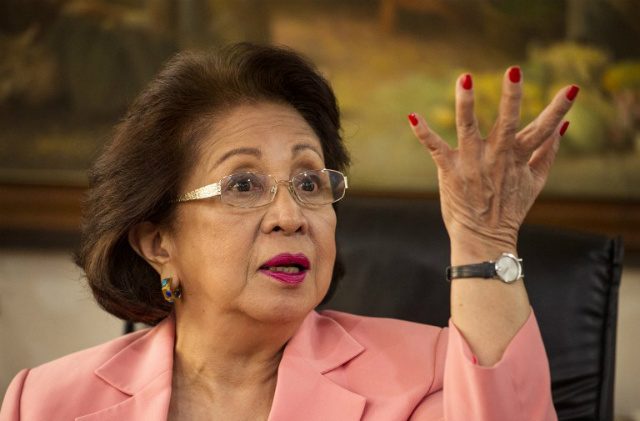SUMMARY
This is AI generated summarization, which may have errors. For context, always refer to the full article.

MANILA, Philippines – People should not cheer for human rights abuses out of a sense of “blind loyalty,” Ombudsman Conchita Carpio Morales said, as she stressed the need for good leadership in these “trying times” for the country.
Morales issued this message on Friday evening, November 25, during the alumni homecoming of the University of the Philippines College of Law.
In her speech, Morales said the country needs to go “back to basics.”
“Thou shall not steal. Thou shall not kill,” Morales said.
The Ombudsman continued: “When leaders seem to send the message of promoting rather than condemning reprehensible acts that transgress basic human rights, the people ought to be concerned about it, rather than cheering for it either out of sheer ignorance, callous conscience, blind loyalty, or gorgonized fanaticism.”
Her statement comes as critics accuse the Duterte administration of human rights abuses in its war on drugs.
More than 4,940 drug suspects have died since July 1, a day after President Rodrigo Duterte took office.
Of this number, 3,001 have been slain in extrajudicial or vigilante-style killings.
Duterte himself has encouraged policemen to kill drug suspects who resist arrest. If they do so, Duterte even told them once, “I’ll give you a medal.”
Duterte’s statements have alarmed human rights groups who consider these an apparent endorsement of killings.
Despite criticisms against him, however, Duterte continues to enjoy high satisfaction ratings.
A recent Social Weather Stations survey, in fact, showed respondents giving the Duterte administration a “very good” satisfaction rating for “promoting human rights.”
‘Ogre that never dies’
What Filipinos need to realize, according to Morales, is the link between human rights violations and corruption.
“In linking corruption and human rights violations, one study concludes that when corruption thrives, human rights are denied, and correlatively, when denial of human rights continues, corruption persists,” the Ombudsman said.
Morales – whose brother is the father-in-law of Duterte’s daughter, Sara – then stressed the need for good leadership.
She warned “great people” against falling prey to corruption and transforming into predators.
To drive home her point, Morales recounted the parable of the “Ogre That Never Dies,” which goes:
A long time ago, a very brutal and powerful Ogre terrorized a town whose inhabitants had long sought heroes to rid the Ogre from their land.
Then came two great warriors. One of them decided to take on the challenge and sought the Ogre.
Months passed and still no news came on what happened to the first warrior. Worried that his friend might have fallen in the hands of the Ogre, the second warrior also decided to hunt down the tyrant.
At the top of the mountain near the village, he met, fought and finally killed the Ogre after a long duel. The second warrior exclaimed, “Oh how such a meaningless beast like you conquered and defeated my friend…You haven’t realized how mighty I am!”
But before he could finish his statement, he noticed the beast transform and change into the likeness of his friend. It dawned upon the victorious warrior that the Ogre was not at all immortal and that whoever defeated it eventually became the Ogre himself.
(READ: Killing the ogre that never dies)
Morales explained, “The monstrosity of supremacy and the trappings of power aptly explain why great people fall as prey and transform as predators themselves.”
“The relevant message is that we cannot pretend to end impunity by clothing ourselves with impunity as well. He who enforces accountability must himself be ready to assume accountability,” she added in her speech that also touched on the Marcos burial issue.
Toward the end of her speech, the Ombudsman said: “It seems that no matter how highly we regard ourselves, there is still a higher order: there exists the overarching rule of law. The law serves as the proverbial lighthouse that guides a nation as it charts the course of history.” – Rappler.com
Add a comment
How does this make you feel?
There are no comments yet. Add your comment to start the conversation.